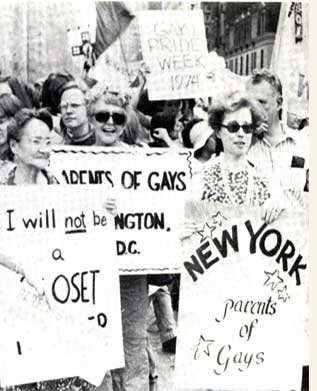




Interview with Betty Goldwarg, former head of
PFLAG Montreal
When did you join PFLAG? How long have you been involved in PFLAG?
I got involved in PFLAG six and a half to seven years ago but I'm not involved anymore. I stopped because I was too busy.
What prompted you to first join PFLAG?
My son Jordan is gay and when he first came out to me, my husband and I had a lot of questions. I wanted to talk to other parents who were going through the same thing and PFLAG had just started in Canada.
What kinds of things did you have to do as head of PFLAG Montreal?
A couple of years after I joined, I became the head of PFLAG Montreal. PFLAG is for anyone included in the name and our main purpose to is to provide education for parents who were worried because homophobia still exists. We wanted to demystify stereotypes against gays and lesbians. In order to do that, we invited successful gay and lesbian speakers to help the parents overcome their fear of marginalization for their children. The meetings were primarily attended by parents but sometimes their children came as well.
What do you think was your greatest accomplishment at PFLAG?
About three and a half years ago, we had a gay speaker named Mark Tewksbury, a Canadian two-time Olympic gold medalist in swimming. At this point PFLAG Montreal was housed in a synagogue that though Jewish was nondenominational in the people it welcomes for PFLAG. The meetings usually had very few people in attendance; when he came, it drew in a crowd of five hundred people. It was a phenomenal success and Mark was an unbelievable speaker. The best part about it was that it attracted a large spectrum of people: gay, straights, friends and family, you name it. For months after, people came up to me and told me that his speech made them think differently about lesbians and gays.
What does it mean to you to be a part of PFLAG?
It was a terrific experience but it was sometimes frustrating. For example we sometimes held meetings in negative twenty degree weather just to have two people show up. I should mention that in my years as head, I had a co-leader who was a lesbian. She's now thirty-two or thirty-three and coincidently I've known her since she was born. Working with her gave me an even better perspective on gays and lesbians than I already had working as a high school counselor and therapist sometimes working with kids who were in the process of coming out.
Was there one particular experience that sticks in your mind? If so, please describe it.
One time a mother, father and their son, who was sixteen, came to a meeting, only two times, I think. The father had a terrible time accepting that his son was gay and would often trash him. He was really awful to him. The second time they came, the dad started to cry. He said, "The reason I'm crying is because I'm so afraid for you, not because I'm angry." This was a real turning point in accepting his son.
That's an amazing experience and I'm sure you had lots more. How do you think this was different than from when PFLAG first started in 1973?
Well, in '73 people who had gay kids felt much more shame than now. Parents were ashamed of their gay children. At least in a work situation, they would pretend it wasn't true. They figured they were the only one with gay children.
What do you think is a good way for people to get involved in PFLAG?
To help, you don't have to be formally involved in PFLAG. I'm sure in school you've heard people say "that's so gay" or "you're such a fag." The best thing to do is to find the courage to speak up. Real grass-roots things, on a fundamental level are what create change.
PFLAG is an organization committed to building a community. Do you think this goal of creating a community has been achieved?
Hm. It has in many places, but unfortunately it has not been successful in Montreal. Only twenty percent of Montreal's first language is English, like me and Jordan, and the rest speaks French. PFLAG hasn't expanded to the French sector. PFLAG Montreal has been on and off since its inception. After I resigned as the head, it died for a year but came back last year and is now run by a young gay man who is a PhD student at McGill.
Why do you think PFLAG hasn't been successful in Montreal?
I think that part of the reason is that they are a very tolerant society and so there are other resources such as health information services, gay and lesbian centers at universities and schools talk about sexual orientation openly in sex-ed classes. Small towns, on the other hand, have dozens of people coming out to PFLAG meetings because they don't have as many resources. This could be part of the reason, but I'm not completely sure. Overall, PFLAG has been phenomenally successful everywhere else, just not in Montreal.
We know you have helped PFLAG, but how had PFLAG helped you?
PFLAG primarily helped me when I first found out my son was gay. I had worked with gays and lesbians in my therapy but it was still surprising. Some parents have suspicions from an early age that their child is gay. We had a lot of questions and it was very helpful to talk to people in similar situations and PFLAG gave us the opportunity to get answers.
Do you have any other PFLAG experiences you would like to share with us?
Here is a statistic that I found very interesting: gay and lesbian kids have a greater risk of drug and alcohol abuse and depression leading to suicide attempts. They're two to six times more likely to have thoughts of or attempt suicide. The numbers are overwhelming. The reason they are so desperate, I've found in my therapy, is the assumption that the world is straight. They feel like they're living a lie and that they're invisible. There has been much progress made since the seventies in this issue, but there is still rampant homophobia as shown in teen slang. Slurs about ethnicity are now considered politically incorrect but slurs on sexual orientation are not seen in the same way. Kids have the right to feel safe at school.
What do you think PFLAG is all about?
I think what they do explains what they stand for. They are all about asking questions and giving answers. It is a community for gay and lesbians and their families so they don't have to feel isolated and suffer silently. PFLAG and its members are agents of social change. We've all made a lot of progress but we're not all the way there yet. Even in places where it seems equal there are still injustices. For example in Massachusetts, where gay marriage is legal, even if married to an American citizen, a foreigner in a gay marriage is still not granted a green card while a straight foreigner would be. We have come a long way, but there is still a lot more work left to do.
 |
|
|
|||||||||
|
|
|
|
|
||||||||
|
|
|
|
|
|
|
|
|
||||
|
|
 |
|
|||||||||
|
|
|
 |
|
||||||||
 |
 |
|
|||||||||
|
|
|
||||||||||
|
|
|
|
|
|
|
|
|
|
|
|
|
 |
||
 |
||
 |
||
 |
||
 |
||